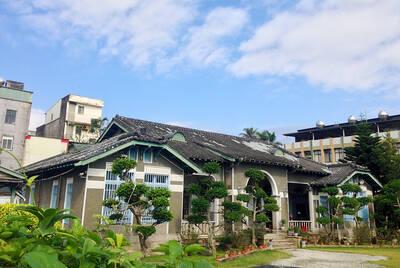It’s always a letdown when the opening sequence is the most interesting part of a movie. Luckily the scene, set in an outer space noodle restaurant whose food’s taste changes according to the owner’s mood, reoccurs throughout Didi’s Dreams (吃吃的愛), which is otherwise a rather pedestrian, over-the-top sap fest that has become typical of Taiwanese comedies.
It does have entertainment value, though, being one of those films that seems to be somewhat aware that it is cheesy, even going as far as to poke fun at itself and other cringe-worthy romance flicks. This may be its saving grace as the results are quite funny at certain points. The production is superb, living up to its whopping NT$250 million budget.
While food does play a minor part in the “main” story, one can’t help but wonder if the Chinese film title (literally “eat eat love”) would be more apt if it was entirely set in the outer space restaurant. It seems like a fun place with all kinds of bizarrely dressed customers who we first see competing to see who can stay still for the longest time. The core of the restaurant is the soup, which only the owner (Dee Hsu, 徐熙娣) can touch — and with her heart broken, the customers can taste her tears. When an astronaut garbageman seduces her and steals her soup … well, that’s the beginning of a promising movie.

Photo courtesy of Kbro Media
Instead, the main focus is Shangguan Didi (上官娣娣), also played by Hsu, who supposedly dreams of the restaurant every night (there’s a clever plot twist involving these two worlds that we don’t dare reveal). Her life is far less interesting as an aspiring actress who lives in the shadow of her superstar older sister, Shangguan Lingling (上官玲玲), played by Lin Chi-ling (林志玲). Their tense relationship drives the main plot as the two eventually end up being cast in the same movie. Here, the excessive plot devices to elicit all kinds of emotions are unleashed, probably to mask the thin storyline. And of course, you have the prerequisite ultra-considerate, caring boyfriend (Jin Shijia, 金世佳) who never leaves Didi’s side and even cuts her nails for her.
Given their professional standing in the film, it’s ironic that Lin, arguably Taiwan’s most famous female model, can’t really act or deliver her lines properly. Hsu is obviously more talented as far as entertaining goes (even lending her voice to the soundtrack, including a brainwashing tongue twister about a carp and a donkey) but in the film she can only land bit roles as zombies or bacteria in a stomach medicine commercial. She plays the carefree, impulsive and blunt Didi well, creating a likeable character that refers to herself as laoniang (老娘, this old lady).
Those even vaguely familiar with Taiwanese pop culture should know that the film will have its guaranteed audience from the fan base of the wildly popular variety show Here Comes Kangxi (康熙來了), hosted by Hsu and Kevin Tsai (蔡康永). The show aired its final episode last January, and those who miss the show should be excited about the reunion of the pair, although Tsai doesn’t appear on screen in his directorial debut. But only those very familiar with Taiwanese pop culture would know that several actors who play sadistic casting agents in the movie who give Didi a hard time are former guests who have been pranked by the hosts in the past.
As the show was also a smash hit in China, it’s no surprise that this is a joint Chinese-Taiwanese production. As a result you have a mix of Chinese and Taiwanese actors, which is not as bad as Hong Kong-China productions that switch incessantly between Cantonese and Mandarin as if the two languages are mutually intelligible. This kind of fantastical film is not aiming for authenticity, but it’s still a bit jarring when characters speak in different accents in a vague setting where the street scenes go from Taiwan to China in one motorcycle trip, and the subtitles inexplicably switches from simplified to traditional Chinese in different scenes. We don’t want to get too political here, but the audience does notice these things and it can be quite disconcerting. Unfortunately, there’s just so much more money to be made on the other side of the Taiwan Strait that there’s no stopping this trend.

When life gives you trees, make paper. That was one of the first thoughts to cross my mind as I explored what’s now called Chung Hsing Cultural and Creative Park (中興文化創意園區, CHCCP) in Yilan County’s Wujie Township (五結). Northeast Taiwan boasts an abundance of forest resources. Yilan County is home to both Taipingshan National Forest Recreation Area (太平山國家森林遊樂區) — by far the largest reserve of its kind in the country — and Makauy Ecological Park (馬告生態園區, see “Towering trees and a tranquil lake” in the May 13, 2022 edition of this newspaper). So it was inevitable that industrial-scale paper making would

Asked to define sex, most people will say it means penetration and anything else is just “foreplay,” says Kate Moyle, a psychosexual and relationship therapist, and author of The Science of Sex. “This pedestals intercourse as ‘real sex’ and other sexual acts as something done before penetration rather than as deserving credit in their own right,” she says. Lesbian, bisexual and gay people tend to have a broader definition. Sex education historically revolved around reproduction (therefore penetration), which is just one of hundreds of reasons people have sex. If you think of penetration as the sex you “should” be having, you might

July 21 to July 27 If the “Taiwan Independence Association” (TIA) incident had happened four years earlier, it probably wouldn’t have caused much of an uproar. But the arrest of four young suspected independence activists in the early hours of May 9, 1991, sparked outrage, with many denouncing it as a return to the White Terror — a time when anyone could be detained for suspected seditious activity. Not only had martial law been lifted in 1987, just days earlier on May 1, the government had abolished the Temporary Provisions Effective During the Period of National Mobilization for Suppression of the Communist

Hualien lawmaker Fu Kun-chi (傅?萁) is the prime target of the recall campaigns. They want to bring him and everything he represents crashing down. This is an existential test for Fu and a critical symbolic test for the campaigners. It is also a crucial test for both the Chinese Nationalist Party (KMT) and a personal one for party Chairman Eric Chu (朱立倫). Why is Fu such a lightning rod? LOCAL LORD At the dawn of the 2020s, Fu, running as an independent candidate, beat incumbent Democratic Progressive Party (DPP) lawmaker Hsiao Bi-khim (蕭美琴) and a KMT candidate to return to the legislature representing